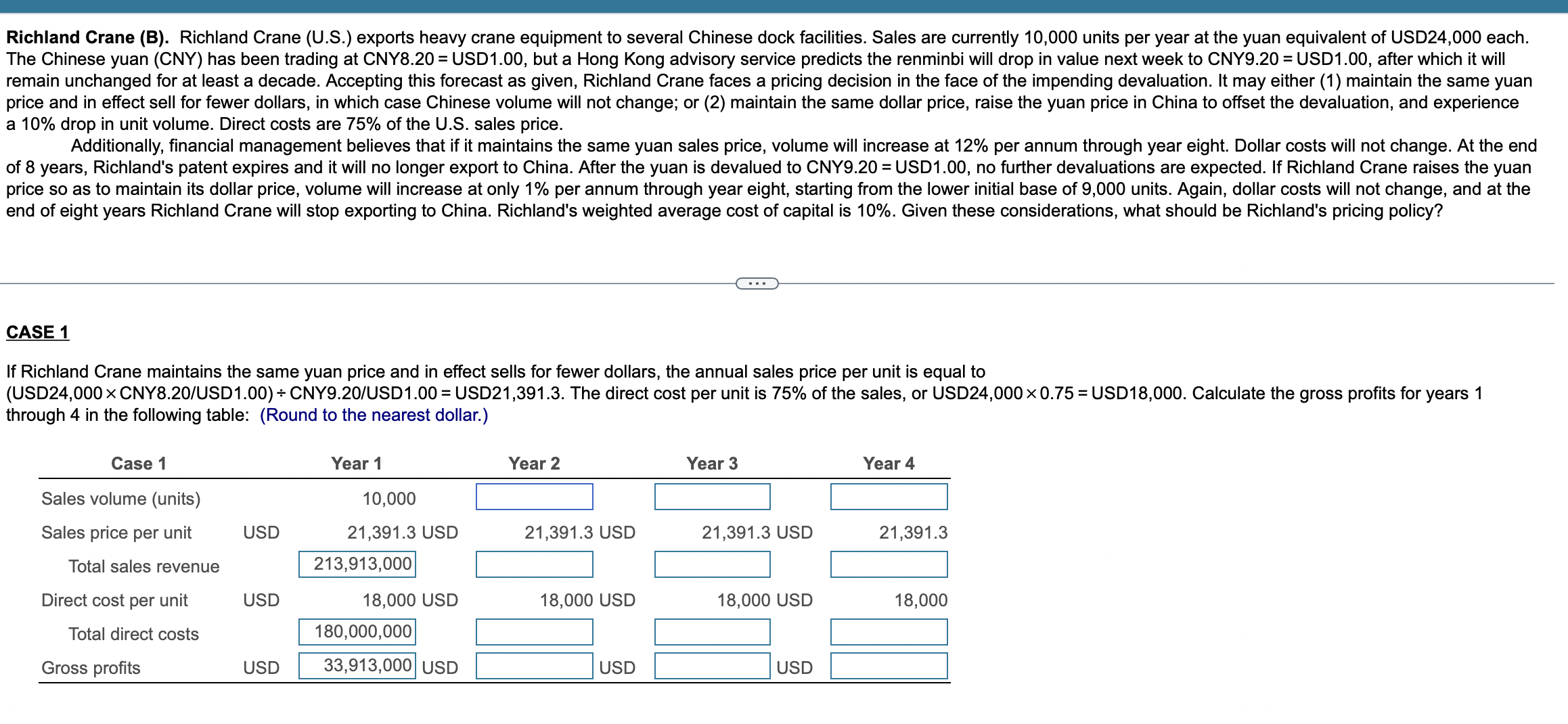Answered step by step
Verified Expert Solution
Question
1 Approved Answer
I need help Richland Crane (B). Richland Crane (U.S.) exports heavy crane equipment to several Chinese dock facilities. Sales are currently 10,000 units per year
I need help
 Richland Crane (B). Richland Crane (U.S.) exports heavy crane equipment to several Chinese dock facilities. Sales are currently 10,000 units per year at the yuan equivalent of USD24,000 each. The Chinese yuan (CNY) has been trading at CNY8.20 = USD1.00, but a Hong Kong advisory service predicts the renminbi will drop in value next week to CNY9.20 = USD1.00, after which it will remain unchanged for at least a decade. Accepting this forecast as given, Richland Crane faces a pricing decision in the face of the impending devaluation. It may either (1) maintain the same yuan price and in effect sell for fewer dollars, in which case Chinese volume will not change; or (2) maintain the same dollar price, raise the yuan price in China to offset the devaluation, and experience a 10% drop in unit volume. Direct costs are 75% of the U.S. sales price. Additionally, financial management believes that if it maintains the same yuan sales price, volume will increase at 12% per annum through year eight. Dollar costs will not change. At the end of 8 years, Richland's patent expires and it will no longer export to China. After the yuan is devalued to CNY9.20= USD1.00, no further devaluations are expected. If Richland Crane raises the yuan price so as to maintain its dollar price, volume will increase at only 1% per annum through year eight, starting from the lower initial base of 9,000 units. Again, dollar costs will not change, and at the end of eight years Richland Crane will stop exporting to China. Richland's weighted average cost of capital is 10%. Given these considerations, what should be Richland's pricing policy? CASE 1 If Richland Crane maintains the same yuan price and in effect sells for fewer dollars, the annual sales price per unit is equal to (USD24,000 CNY8.20/USD1.00) CNY9.20/USD1.00 = USD21,391.3. The direct cost per unit is 75% of the sales, or USD24,000 0.75= USD18,000. Calculate the gross profits for years 1 through 4 in the following table: (Round to the nearest dollar.)
Richland Crane (B). Richland Crane (U.S.) exports heavy crane equipment to several Chinese dock facilities. Sales are currently 10,000 units per year at the yuan equivalent of USD24,000 each. The Chinese yuan (CNY) has been trading at CNY8.20 = USD1.00, but a Hong Kong advisory service predicts the renminbi will drop in value next week to CNY9.20 = USD1.00, after which it will remain unchanged for at least a decade. Accepting this forecast as given, Richland Crane faces a pricing decision in the face of the impending devaluation. It may either (1) maintain the same yuan price and in effect sell for fewer dollars, in which case Chinese volume will not change; or (2) maintain the same dollar price, raise the yuan price in China to offset the devaluation, and experience a 10% drop in unit volume. Direct costs are 75% of the U.S. sales price. Additionally, financial management believes that if it maintains the same yuan sales price, volume will increase at 12% per annum through year eight. Dollar costs will not change. At the end of 8 years, Richland's patent expires and it will no longer export to China. After the yuan is devalued to CNY9.20= USD1.00, no further devaluations are expected. If Richland Crane raises the yuan price so as to maintain its dollar price, volume will increase at only 1% per annum through year eight, starting from the lower initial base of 9,000 units. Again, dollar costs will not change, and at the end of eight years Richland Crane will stop exporting to China. Richland's weighted average cost of capital is 10%. Given these considerations, what should be Richland's pricing policy? CASE 1 If Richland Crane maintains the same yuan price and in effect sells for fewer dollars, the annual sales price per unit is equal to (USD24,000 CNY8.20/USD1.00) CNY9.20/USD1.00 = USD21,391.3. The direct cost per unit is 75% of the sales, or USD24,000 0.75= USD18,000. Calculate the gross profits for years 1 through 4 in the following table: (Round to the nearest dollar.) Step by Step Solution
There are 3 Steps involved in it
Step: 1

Get Instant Access to Expert-Tailored Solutions
See step-by-step solutions with expert insights and AI powered tools for academic success
Step: 2

Step: 3

Ace Your Homework with AI
Get the answers you need in no time with our AI-driven, step-by-step assistance
Get Started


